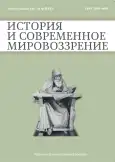Пресса как источник изучения визуального наследия советской повседневности
- Авторы: Клинова М.А.1, Трофимов А.В.1
-
Учреждения:
- Уральский государственный экономический университет
- Выпуск: Том 4, № 2 (2022)
- Страницы: 59-64
- Раздел: Статьи
- URL: https://journal-vniispk.ru/2658-4654/article/view/147225
- ID: 147225
Цитировать
Аннотация
Ключевые слова
Полный текст
Открыть статью на сайте журналаОб авторах
Марина Александровна Клинова
Уральский государственный экономический университет
Email: klinowa.m@yandex.ru
доктор исторических наук, доцент, профессор кафедры креативного управления и гуманитарных наук Екатеринбург, Российская Федерация
Андрей Владимирович Трофимов
Уральский государственный экономический университет
Email: 2519612@rambler.ru
доктор исторических наук, профессор; профессор кафедры креативного управления и гуманитарных наук Екатеринбург, Российская Федерация
Список литературы
- Барт Р. Риторика образа // Ролан Барт. Избранные работы. Семиотика. Поэтика. М.: Прогресс, 1989. 616 с.
- Блок М. Апология истории или ремесло историка. М.: Наука. 1986. 254 с.
- Георгиева Н.Г. Историческое источниковедение: понятийно-терминологические и методические проблемы: учебное пособие для гуманитарных отделений вузов. М.: Проспект, 2016. 192 с.
- Гуревич С.М. Газета: вчера, сегодня, завтра. М.: Аспект пресс; 2004. 288 с.
- Дэвис Дж. Исследования в рекламной деятельности: теория и практика М.: Издательский дом «Вильямс», 2003. 864 с.
- Желтикова И.В. Образ будущего как образ // Ученые записки Орловского государственного университета. Серия: Гуманитарные и социальные науки. 2013. №5. С.75-80.
- Ипполитов Г.М. Классификация источников в проблемно тематических историографических исследованиях и некоторые методологические подходы к их анализу // Известия Самарского научного центра Российской академии наук, т. 13, №3 (2), 2011. С. 501-509.
- Источниковедение новейшей истории России: теория, методология, практика. М.: РОССПЭН, 2004. 741 с.
- Источниковедение: Теория. История. Метод. М.: Российск. гос. гуманит. ун-т, 1998. 702 с.
- Источниковедение: Учеб. пособие / И.Н. Данилевский, Д. А. Добровольский, Р.Б. Казаков и др.; отв. ред. М.Ф. Румянцева. М.: Изд. дом Высшей школы экономики, 2015. 685 с.
- Кабанов В.В. Источниковедение истории советского общества: курс лекций. М.: РГГУ, 1997. 385 с.
- Каменская Е.В. Периодическая печать как исторический источник: специфика и возможности использования // Человек, общество, власть. К 100-летию российской революции 1917 года. Екатеринбург. 2017. С. 37-45.
- Каменская Е.В. Города Китая 1950-х гг. на страницах советской печати (по материалам журнала «Огонек») // Россия - Китай: история и культура: сборник статей и докладов участников XII международной научно-практической конференции (10-12 октября 2019 г.). Казань: Издательство «Фэн», АН РТ, 2019. - С. 204-211.
- Клинова М.А. «Культурный отдых» советского человека: по материалам фотографий в отечественных СМИ послевоенного периода // Человек в мире культуры: проблемы науки и образования (XIV Колосницынские чтения). Материалы международной научной конференции. Екатеринбург. 2019. С. 162-165.
- Клинова М.А. Концепция «культурности» в социальной политике второй половины 1930-х годов // Человек. 2017. № 4. С. 94-105. (95)
- Клинова М.А., Трофимов А.В. Конструирование негативного имиджа «хозяйственника» на страницах журнала «Крокодил» в 1953-1964 гг. // Гуманитарные науки в Сибири. 2017. Т. 24. № 3. С. 78-82
- Лапина А.А. Историческая имагология: проблема методов и категорий // Ученые записки Орловского государственного университета. 2019. № 4 (85). С. 28-32.
- Мазур Л.Н. Визуализация истории: новый поворот в развитии исторического познания // Quaestio Rossica. 2015. № 3. С. 161-178.
- Массовая информация в советском промышленном городе: Опыт комплексного социологического исследования / Под общ. ред. Б. А. Грушина, Л. А. Оникова. М.: Политиздат, 1980. 446 с.
- Митина Р.В. Пермские газеты как источник изучения Первой мировой войны: постсоветская историография // Вестник Пермского ун-та. Сер. История. 2015. №4 (31). С. 72-81;
- Орех Е.А. Образ советского вождя: визуальные послания первой половины XX века (на материалах центральных и местных газет) // Властные структуры и группы доминирования. С-Пб.: Изд. СПГУ, 2012. С. 473-493;
- Плампер Я. Алхимия власти: Культ Сталина в изобразительном искусстве. М.: НЛО, 2010. 496 с.
- Пушкарев Л.Н. Классификация русских письменных источников по отечественной истории. М.: Наука, 1975. 281 с.
- Пушкарева Н.Л. История повседневности: предмет и методы // Социальная история: Ежегодник, 2007. М.: РОССПЭН, 2008. 368 с.
- Рынков В. М. Периодическая печать: место в системе исторических источников // Отечественные архивы. 2010. № 3. С. 44-50.
- Семёнова А.В., Корсунская М.В. Контент-анализ СМИ: проблемы и опыт применения. М.: Институт социологии РАН, 2010. 324 с.
- Славко Т.И., Русина Ю.А. Источниковедение отечественной истории советского периода. Екатеринбург, Изд-во Урал. ун-та, 1995. 236 с.
- Суржикова Н.В. Коллизии уральского плена в зеркале региональной печати (1914-1917 гг.) // Проблемы отечественной истории: источники, историография, исследования: сб. науч. статей. СПб.; Киев; Минск, Нестор-История, 2008. С. 90-121.
- Федотова, Л. Н. Анализ содержания - социологический метод изучения средств массовой коммуникации. М.: Научный мир, 2001. 214 с.
- Фомичева И.Д. Методика формализованного анализа фотоснимков // Современные методы исследования средств массовой коммуникации. Таллин, 1983. С. 145-149.
- Фомичева И.Д., Марковский Э.Я. Опыт качественно-количественного анализа газетной фотографии // Социологические исследования эффективности журналистики. М.: Изд-во МГУ, 1986. С. 94-103.
- Чернавский А. С. Фотографический образ как предмет интерпретации // Методология моделирования и прогнозирования современного мира. № 3. 2012. С. 182. (182 - 196)
- Штомпка П. Визуальная социология. Фотография как метод исследования. М.: Логос, 2007. 168 с.
Дополнительные файлы








